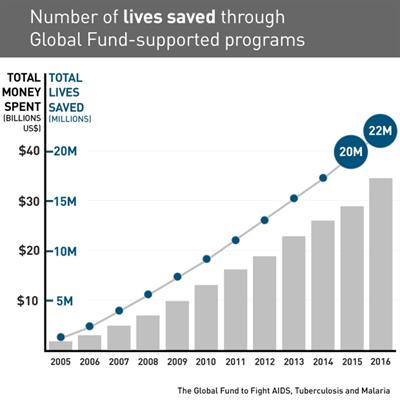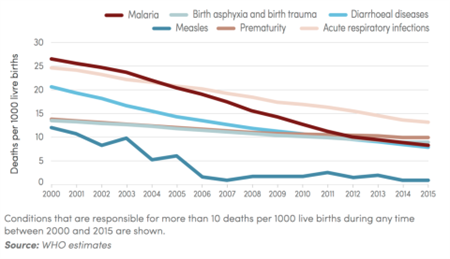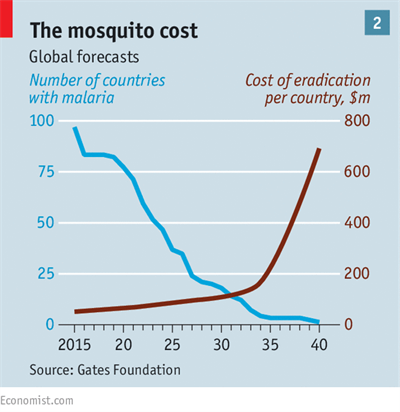Colleagues:
 I was honored to join the official U.S. Government delegation to the Global Fund to Fight AIDS, Tuberculosis and Malaria’s Fifth Replenishment Conference last week in Montreal, Canada. The replenishment both achieved its monetary goal and demonstrated what can be accomplished by rallying the world and working together. The United States has pledged up to $4.3 billion to the Global Fund over the next 3 years that will leverage $2 for every $1 of U.S. investment and could save 8 million lives and avert up to 300 million new infections across the 3 diseases.
I was honored to join the official U.S. Government delegation to the Global Fund to Fight AIDS, Tuberculosis and Malaria’s Fifth Replenishment Conference last week in Montreal, Canada. The replenishment both achieved its monetary goal and demonstrated what can be accomplished by rallying the world and working together. The United States has pledged up to $4.3 billion to the Global Fund over the next 3 years that will leverage $2 for every $1 of U.S. investment and could save 8 million lives and avert up to 300 million new infections across the 3 diseases.
As I participated in the conference, I was reminded of how much more we can achieve when we marshal the power of communities and rally people from the globe over to solve the world’s most pressing problems. Health workers, students, the private sector, non-profits, the faith community, donors – we all achieve more when we work together and leverage each other’s diverse strengths.
Global Fund and PMI: Partnering for Impact
 The U.S. President’s Malaria Initiative (PMI), the U.S. Government’s bilateral commitment against the disease, works closely with the Global Fund at the country, regional, and global level to coordinate investments for malaria control to maximize impact. PMI has sought, from the beginning, to complement the Global Fund, working only in countries where the Global Fund has a presence, assessing available resources and filling unmet needs. Currently, all 19 PMI focus countries in Africa — as well as a regional program in the Greater Mekong subregion of Southeast Asia — receive substantial funding from the Global Fund. The Global Fund and PMI are able to achieve greater results together.
The U.S. President’s Malaria Initiative (PMI), the U.S. Government’s bilateral commitment against the disease, works closely with the Global Fund at the country, regional, and global level to coordinate investments for malaria control to maximize impact. PMI has sought, from the beginning, to complement the Global Fund, working only in countries where the Global Fund has a presence, assessing available resources and filling unmet needs. Currently, all 19 PMI focus countries in Africa — as well as a regional program in the Greater Mekong subregion of Southeast Asia — receive substantial funding from the Global Fund. The Global Fund and PMI are able to achieve greater results together.
At the country level, neither could do it alone. The two programs work in synergy, and as a result, the impact of the U.S. Government’s investments is amplified – for every dollar of PMI bilateral assistance, the Global Fund provides two. And through a strong in-country presence, PMI provides robust state-of-the-art technical assistance, which ensures that both PMI and Global Fund investments are effectively programmed and have the maximum impact.
The Global Fund partnership and U.S. Government leadership have been crucial components to the successes we are seeing in the fight against malaria. As a result of PMI and Global Fund support, hundreds of millions of people have benefited from protective measures against malaria, and hundreds of millions more have been diagnosed and treated for malaria. Even in the poorest of settings where malaria flourishes, we are arming women, children, and families with cost-effective tools to protect themselves from malaria and with fast-acting medicines to cure malaria if they do become infected.
Sustaining Gains
 Malaria is no longer the leading cause of death among children in sub-Saharan Africa. But Africa still bears the biggest malaria burden with roughly 190 million cases and 400,000 deaths in 2015 alone, accounting for 89 percent and 91 percent of the world’s total, respectively.
Malaria is no longer the leading cause of death among children in sub-Saharan Africa. But Africa still bears the biggest malaria burden with roughly 190 million cases and 400,000 deaths in 2015 alone, accounting for 89 percent and 91 percent of the world’s total, respectively.
Fifteen countries, mainly in Africa, account for 78 percent of malaria cases and 80 percent of deaths globally. Two countries, Nigeria and the Democratic Republic of Congo, together account for more than 35 percent of global malaria deaths.
We must continue to focus on the community. Malaria is both a cause and a consequence of poverty. Malaria has an impact on all age groups and all parts of society, but its impact is especially ferocious on the poorest people within communities. Malaria’s “marginalized” are the rural poor, and they are at increased risk due to a number of factors, including being less able to afford preventive measures and medical treatment, poorer housing infrastructure, etc.
Paradox of Success
 We have made substantial progress in controlling malaria. Since 2000, malaria death rates have plunged by 66 percent, translating into 6.2 million lives saved, the vast majority of them children.
We have made substantial progress in controlling malaria. Since 2000, malaria death rates have plunged by 66 percent, translating into 6.2 million lives saved, the vast majority of them children.
In some countries, malaria is becoming more focalized, and it is often the poor, rural, and indigenous populations that are most affected as they still face barriers to accessing services for financial, geographic, and cultural reasons.
And in some countries, we face a paradox of success. As malaria becomes less of a threat, it will become harder to keep the disease high on national agendas, tougher to finance, and more challenging to implement control measures. As countries continue to make progress in scaling up malaria control interventions, it becomes increasingly difficult to get needed commodities and services to those who have not yet been reached, including remote and mobile populations.
And, parents who may not perceive malaria as a threat may choose not to take precautions, while parliamentarians and other leaders may not see the value of continuing to commit resources for a disappearing disease.
But without sustained control efforts, malaria can rebound. Thus, countries must remain vigilant and maintain support for malaria prevention and treatment, despite the reduced burden of malaria.
U.N. General Assembly
I also had the privilege of attending the 71st Session of the United Nations General Assembly, known as UNGA. The world’s most pressing problems are contemplated and debated here. As the world grapples with violence, instability, the global refugee crisis, and the threat of nuclear weapons, we must remember the impact of chronic disasters like poverty, disease, and hunger that conspire against children and families.
In the next 5 to 10 years, we can significantly reduce malaria as a major public health threat for hundreds of millions of people. But to do so, we must continue to rally in support of malaria. We need to view the battle against malaria as pro-poor policy. We need to see the investment in the context of ending extreme poverty, achieving the sustainable development goals, and unlocking human potential. Fighting malaria is one of the smartest investments anyone can make to protect health, create opportunity, and foster growth and security, especially among the poor. But, left unchecked, malaria places a tremendous burden on people, the health and education sectors, and economies.
I am incredibly proud of our teams on the ground in PMI focus countries, in Washington, D.C., and Atlanta, all fiercely determined to end malaria for good. I thank them for their diligent work in assisting national malaria control programs to implement their Global Fund grants. This is difficult, important work and an excellent example of partnership. And, it has resulted in the evident success in driving down disease burden and saving lives that contributed to the powerful rationale for increased investment in the Global Fund during the recent replenishment.
Respectfully,

Tim
R.T. Ziemer
Rear Admiral, U.S. Navy (ret)
U.S. Global Malaria Coordinator
